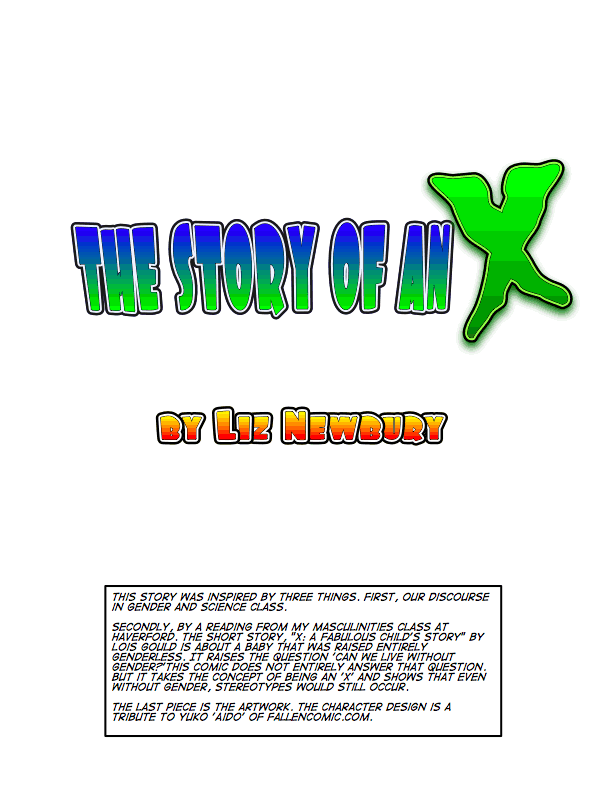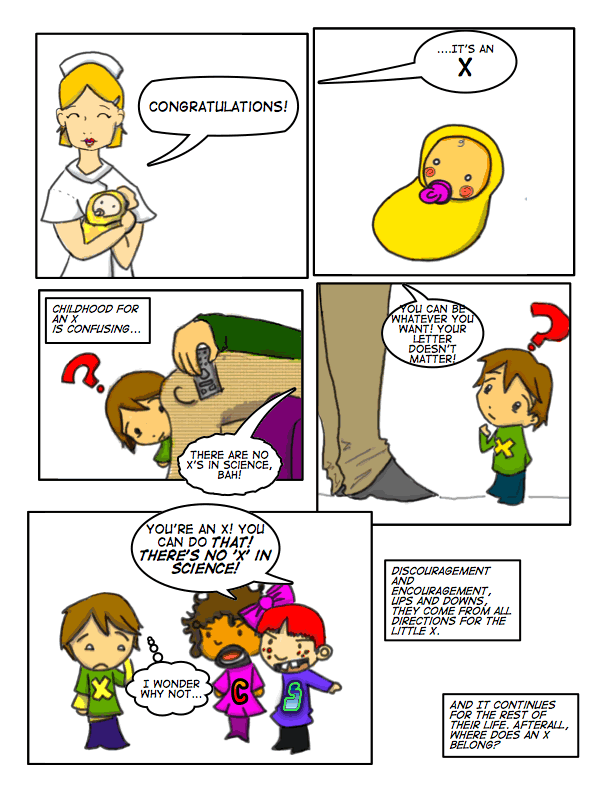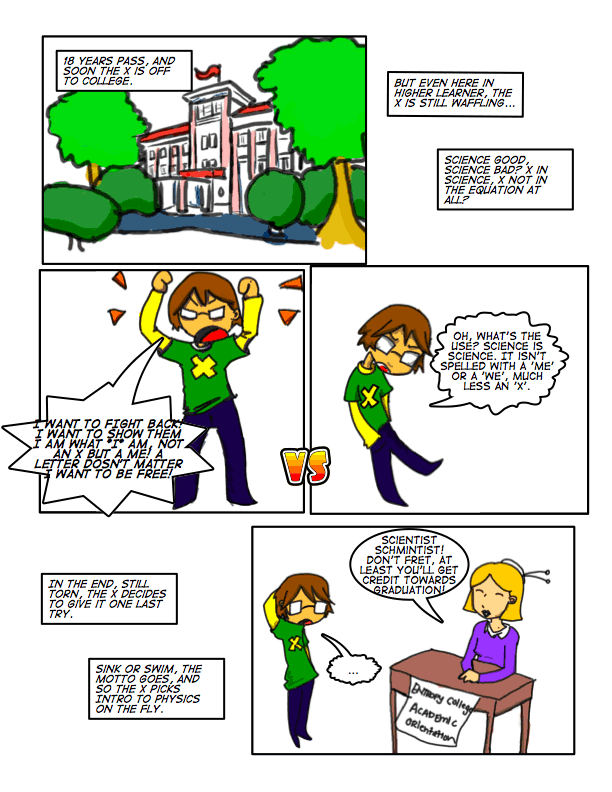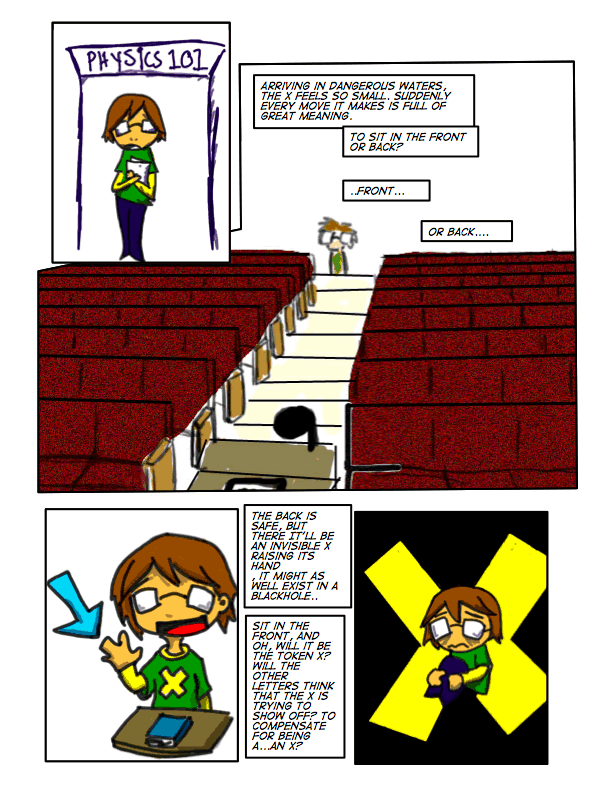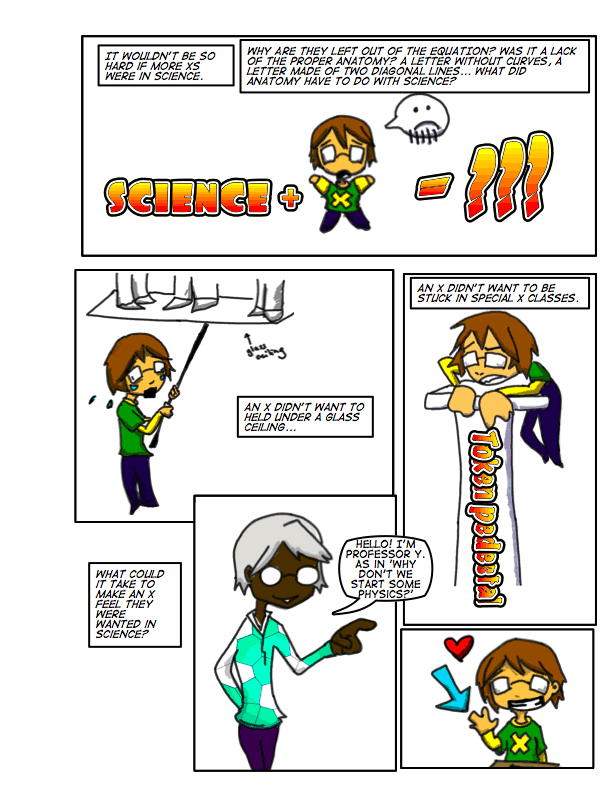Herself.She didn’t know if her cat was alive or dead.It was a common problem, she reflected bitterly, staring at the equations on the page in front of her. Common enough that almost everyone in the room had been through it, or something similar. Although really, in this case, “similar” was stretching it. The page on her desk was vaguely describing a quantum system and asking her questions about it – in a sense, asking whether the cat was alive or dead. But she wasn’t particularly focused on the metaphorical cat’s morphological status; instead she was wondering about college. She had applied to several, and finally received letters in return from each, but (having decided she would rather find it all out at once, rather than stretch the process out more), she hadn’t opened any yet. Yesterday, however, when she got home from school, she had found the very last envelope sitting on the kitchen counter, waiting for her. She had stared at it for a while, then nonchalantly dropped it into the pile of the others, reasoning that it was more urgent to study for her upcoming physics final than to find out about schools. Besides, she didn’t know yet which one she wanted to attend.That was the problem, really, at least part of it – why she hadn’t opened her letters yet. She didn’t know what she wanted them to say and was somehow desperately afraid that she would be inexplicably, unpredictably crushed by the results. She really liked predictability, actually, and had had a great time studying statistics in school and then teaching herself more advanced math in her free time. She knew her odds for getting into each of the schools to which she applied, but somehow those numbers were not comforting, and they were certainly not making her decision for her.She looked up from the physics exam and scanned the classroom. Sixteen males (hard to call them boys at this age, but too depressing to think of them as men) and three other females. That put her in the minority already, but to subdivide further she was the only girl really interested in the subject – certainly the only one applying to college.Ah, college. Where? Why? And what would it be like? She’d heard horror stories from her mother about college, but she was fairly certain they were fictional, as her mother had never gone to one herself (except possibly for parties, and if that were the case she would never mention those stories). She had also heard, from her mentoring physics and chemistry teacher, that while college was the challenge you wanted it to be, it wasn’t always fun and it wasn’t often kind. But it was worth it, he emphasized. Worth it. Was there an equation for worth? She could easily do the math for four years of tuition at each of her prospective colleges: about $40k a year at the small, out-of-state liberal arts college with the amazing physics program, less than half that at the big, in-state research university or the other big university where her sister was becoming a teacher (no physics program at all), and much, much less to live at home and attend the local community college and learn… what? Was it true that you got what you paid for? Was it true that the research universities would ignore her as an undergrad, while the liberal arts school couldn’t prepare her for graduate school at all?Could they give her what she wanted? Did she even know what she wanted? Had she even gotten in? How was the damn cat today? And how long would it stay that way? She turned, as if remembering, to her physics exam, and began to work through the problems. At least these have a determinate answer, she thought, even if it is a simplification of the realities involved. At least it’s determinable.Her Mother.Sara was worried sick about her youngest daughter. She’d been worried enough when that daughter refused to take home economics and insisted that she needed to learn calculus instead – when on earth would any normal person use that stuff? Enough math to multiply recipes and calculate discounts, sure, but calculus? What did that have to do with real life? Sara couldn’t understand why her daughter buried herself in textbooks as if they were boyfriends and fretted over exams and college applications. They’d had a loud conversation about college, and Sara had made it clear she saw no need for it and, as such, would not be paying for it.But her daughter had simply smiled, and said, “Alright, mom. That’s fine. I’ve got to learn to fend for myself anyway,” and left the room. Sara was beginning to suspect she didn’t have as much control over her daughter as she’d always assumed, and she wasn’t sure yet if that was a good thing or a bad thing. Her other daughter had gone to college, of course, but that was to learn about teaching little children, which shouldn’t have required college but that was the law now, so Sara allowed it. It was one thing for a woman to work hard at helping people and educating children and making the world a safer, better, easier, cleaner place, and another thing entirely to waste one’s parents’ money studying things with names like Chaos and String theoryAt any rate, she certainly couldn’t get her strange child to come out with her on her work, which was so important to the community. Sara belonged to every church committee ever invented, and ran half of them. She was a Good Person, really; serving food to the homeless, singing hymns and praying over people at the hospice, organizing Crop Walks and fund-raising 5k’s and youth group lock-ins. Sara was saving the world, her own way, paying strict attention to what went on in the world and not only voting to use her voice, but also making sure everyone around her knew how she voted, and why, and why they should vote like her, too.She thought about things like calculus, and physics, and how they never solved the world’s problems. What was physics doing about world hunger? And what would physics do about her daughter’s hunger, when she couldn’t find a decent job or a decent man who already had one? Would physics be there for her when she was old and dying, the way Sara was there for the people in the hospice? Medicine she could have understood – being a nurse was a noble profession, of course, but Sara despaired of her daughter doing anything so useful.Her Boyfriend.John wasn’t always sure about her. She could be so straightforward one day – smart and funny and interesting and obviously enamored of him – and go completely weirdo the next. Like, all of a sudden she’s so worried about this college thing. The concept of college was easy for John. He was going to his father’s alma mater, already accepted by their ROTC program, and he was going to very nearly follow in his father’s footsteps – instead of the Special Ops officer his father had been, nothing would do for John but to become a pilot. His only trepidation about it was the math. The recruiting officers were quite impressed with John’s scores in his math classes, since that was apparently important for the job, and he had of course never mentioned that his girlfriend helped him on all his homework. John firmly believed that men and women were wired differently, and that even if his girl was a fluke in the math department, she would never be the kind of pilot he knew he could be. It was a matter of potential, as far as John could see. He had it and she didn’t, no matter what their teachers said, because everyone knew men were better at math, and spatial relations, and anyway the recruiting officer had told him they were phasing out their female pilots because they hesitated too much on the simulators. So even though he was quite confident about his own future, he couldn’t quite see where his current girlfriend fit into it. They’d been together for a couple of years now, and he was working on a way to break up with her. The problem, of course, was her damn college decision – if she chose the same school he was going to, which she had of course applied to, then they could stay together until something better came along for him. Otherwise, breaking up would be fairly easy – time, distance, and new interests and commitments would pull them apart like magnets aligned north to north.Anyway, they’d never work out in the end, because both of their chosen professions – assuming she ever did make it to being a tenured physicist at a university – would involve a lot of moving around. He’d have to go through years of training and then tours of duty, of course, and she’d talked about graduate schools, plural, and post-doc’s, and how long it could take to find a position… no. John would prefer a woman who followed him around or, better yet, stayed put with the kids, someone he could come home to.Her Physics TeacherTom was so proud of her. He’d watched his students mostly slog out the door after their exam, and had carefully watched his one star pupil (knowing she’d never know that about herself; he certainly wasn’t going to tell her!) leave a little more thoughtfully than the others. He figured today was the day she’d make her college decision. Tom knew about her resolution to open all the envelopes at once, since as her favorite teacher he was also a kind of mentor and she told him that kind of thing.He rather liked being her mentor. She was a brilliant mathematically-minded student, and asked really good questions when she visited him between classes or during lunch. It was hardly odd that she never spoke in class – most high school students don’t, not in physics – but he looked forward to their short and almost daily chats. She was someone to discuss physics with in a small, rural, under-educated area, even if she was still on such a low student level.He’d told her once she was a novitiate in the grand mysteries of physics, and she had seemed so pleased. She worked hard and studied hard and Tom appreciated her dedication to the discipline. He knew she’d never make it to her desired spot, of course – who gave women tenure, even now? Well, to pushy, unfeminine women of course, they were all feminists and lesbians and she didn’t seem to be either one. He had great hopes for her in graduate school, however, and felt sure she would become someone’s prized assistant in due course.Tom had tried to encourage her to go to the same big research university he’d attended, and while she had agreed to apply there was no telling if she would decide to go there. It was not a matter of getting in, of course, because Tom had excellent work there both as an undergrad and a graduate student and had retained a lot of his connections. It was how you got things done in this business, as in so many others. And anyway, pulling strings wasn’t nepotism if you really did have the skills to get the job. And she had the skills, no doubt about that. She was even beginning to crack the complex codes of quantum mechanics, an area of physics her burnt-out classmates could only struggle half-heartedly with this late in the semester. Tom couldn’t really believe she understood it fully, however, because she insisted on determinism when there wasn’t any, and resisted the idea that one might find any kind of mysticism in science, especially in physics, even though Tom knew that’s where most of it lived. What could be mysterious in chemistry, the other class he’d taught her in? Only the parts of chemistry that crossed over into physics and became quantum mechanical were, and they hadn’t had any of that in the chemistry curriculum. Now, however, he had time to show her some of the secrets of the universe and was enjoying seeing her grasp them slowly.Her Guidance CounselorGail had positively beamed as she wrote her college application recommendations. Here was a girl who wanted to do physics! Here was a girl willing to stand up to the injustice in the system and fight back! And here, of course, was a girl just sane enough and just determined enough to make it work. Gail thought back to her own days in college and remembered what she had faced. She had wanted to be a chemist, but that was not an option for her, not in that time and place.Gail’s mind floated over old, painful memories – being harassed and teased, having her homework stolen out of her professor’s drop-box, being told she couldn’t do science, being called a “silly little girl” and told to go home. Gail hadn’t gone home. She’d gone back to her dorm and cried to her unsympathetic roommate, who was majoring in Boys with a minor in Fine Arts and had no idea why anyone would willingly subject themselves either to science classes or to the hell women caught for taking them. As old as those memories were, and as long as it had been since Gail really looked at them, they were still pretty painful. Still, she reminded herself, times have changed. This girl will never have her dorm room plastered with pictures of naked women while she’s working in the lab. This girl won’t have drinks spilled on her “accidentally” at parties when some dumb jock asks her what her major is. And maybe she’ll have a decent advisor, not the sullen, resentful man Gail knew so briefly. Gail had switched majors after two years. She changed to child development, not only because she couldn’t stand the chemistry department any longer, but also because she had decided that if she herself couldn’t do science for a living, she was going to help and encourage other girls to do it. She found being a guidance counselor thankless, for the most part, but not hollow enough to quit – there was always one in every class she really thought needed her.

 © Serendip® 1994 - All rights reserved. Privacy Policy
© Serendip® 1994 - All rights reserved. Privacy Policy
